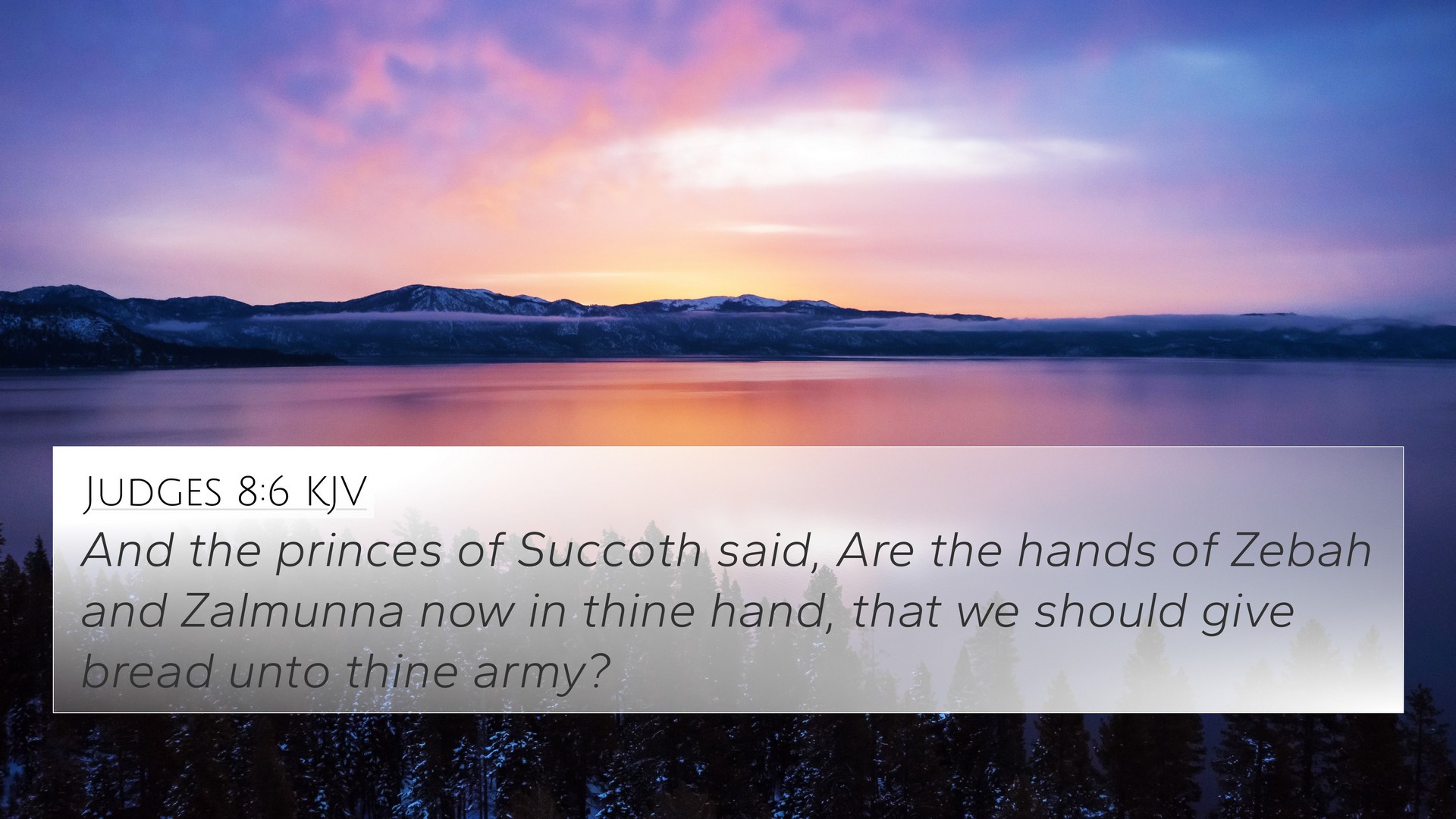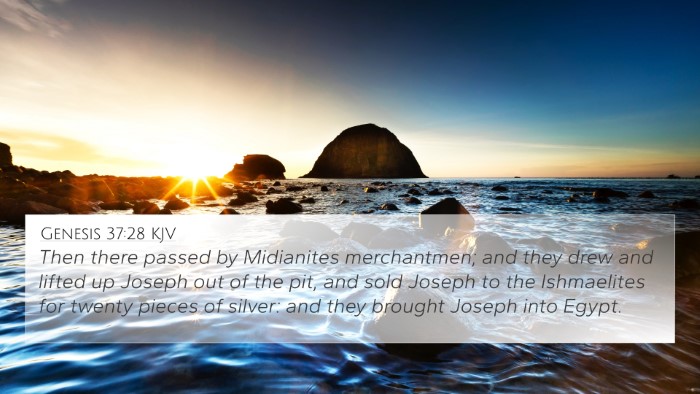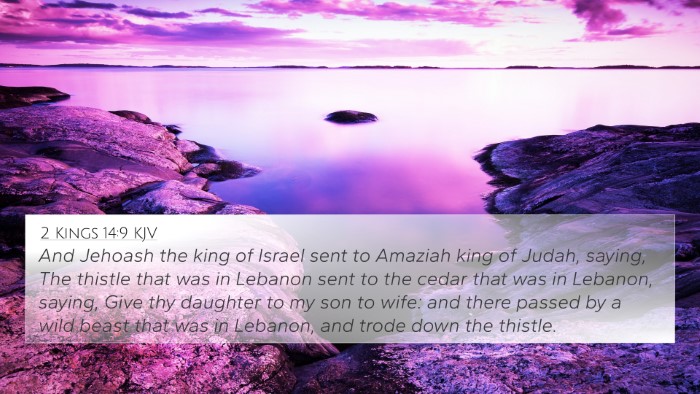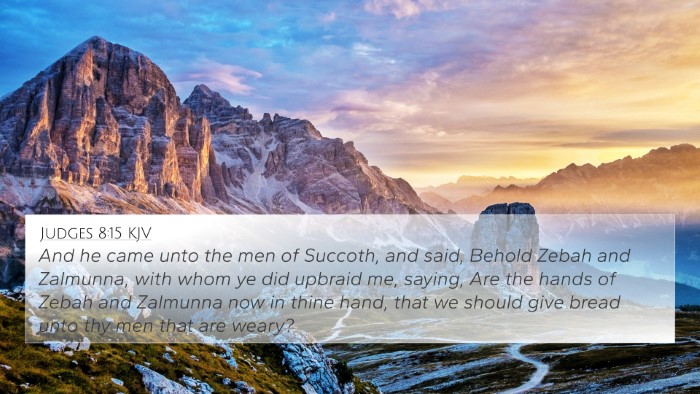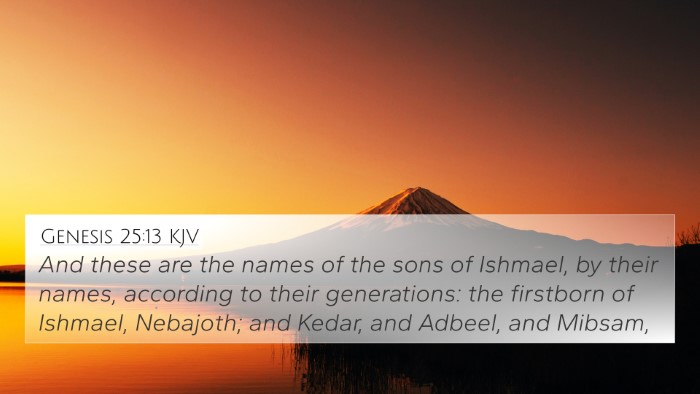Understanding Judges 8:6
Judges 8:6 states: "And the princes of Succoth said, Are the hands of Zebah and Zalmunna now in your hand, that we should give bread unto your army?" This verse reveals the skepticism of the leaders of Succoth towards Gideon's military campaign against the Midianites. Their reluctance to assist reflects a broader theme of doubt and uncertainty within the context of divine deliverance.
Summary of the Verse
This passage illustrates the lack of faith exhibited by the leaders of Succoth. They question Gideon’s intentions and the feasibility of his success against the Midianites. This moment showcases a pivotal struggle between faith in God's guidance and reliance on visible evidence.
Commentary Insights
- Matthew Henry's Commentary:
Henry underscores the cowardice of the leaders of Succoth, who, despite the growing momentum of Gideon’s campaign, chose not to support him. He points out their lack of faith and their unwillingness to take risks for the sake of God’s work. They sought to save themselves rather than trust in God's deliverance through Gideon.
- Albert Barnes' Notes:
Barnes elaborates on the political ramifications of Succoth’s refusal. He notes that their reaction was not just about food and supplies; it symbolized a broader societal fear and distrust in Gideon's capabilities. Their skepticism highlights the conflict between faith and fear that permeates the narrative.
- Adam Clarke's Commentary:
Clarke provides insights into the geographical and historical context of Succoth's leaders' hesitation. Their location in the midst of ongoing conflict with the Midianites made their stance more complicated. He suggests that they lacked a profound understanding of God’s providence and were not prepared to stand firm in faith.
Bible Cross-References
Judges 8:6 can be cross-referenced with several key passages that enhance its understanding:
- 1 Samuel 10:27 - Showing the attitude of those who mock God's chosen leaders.
- 2 Samuel 16:1-4 - Demonstrating similar themes of support and betrayal during warfare.
- Psalm 118:8-9 - Reflecting trust in God over man as a profound biblical principle.
- Matthew 10:14 - Jesus’ teachings on receiving messengers, akin to Gideon’s situation.
- Hebrews 11:32-34 - Mentioning Gideon’s faith as a commendable act contrasted with doubt.
- Judges 6:12 - God’s assurance to Gideon which strengthens the idea of divine support.
- Isaiah 31:1 - Illustrating the folly of relying on human strength over divine guidance.
- Luke 10:10-11 - Teaching on rejected messengers ties back to the same distrust displayed.
- Proverbs 29:25 - Emphasizing that the fear of man leads to a snare, aligning with Succoth's doubts.
- Judges 7:2 - Comparing the early hesitance of the people in Gideon’s call, setting the groundwork for Judges 8:6.
Thematic Connections
The themes present in Judges 8:6 can be viewed through various lenses:
- Faith vs. Fear: The underlying theme of choosing faith in God’s plan against the fear of human consequences.
- Divine Providence: The assurance that God supports His leaders even amid doubt.
- Community and Responsibility: The expectation that community leaders should stand together for a common divine cause.
Using Cross-References for Deeper Understanding
For a profound exploration of scripture and its interconnections, various tools for cross-referencing are invaluable:
- Utilizing a Bible Concordance helps in tracing keywords and related verses.
- A Bible Cross-Reference Guide assists in understanding broader themes that tie different passages.
- Engaging in Cross-Referencing Bible Study fosters a holistic understanding of biblical narratives.
Conclusion
Judges 8:6 invites readers to reflect on the nature of faith and doubt as experienced by Gideon and the leaders of Succoth. By exploring cross-references and employing tools for Bible study, individuals can draw stronger connections and deepen their understanding of scripture.
By studying this verse, one not only sees the immediate narrative but also uncovers patterns and lessons that resonate throughout the Bible. The connections between this verse and other scriptures highlight not just isolated teachings, but the cohesive story of faith that God weaves throughout His Word.
